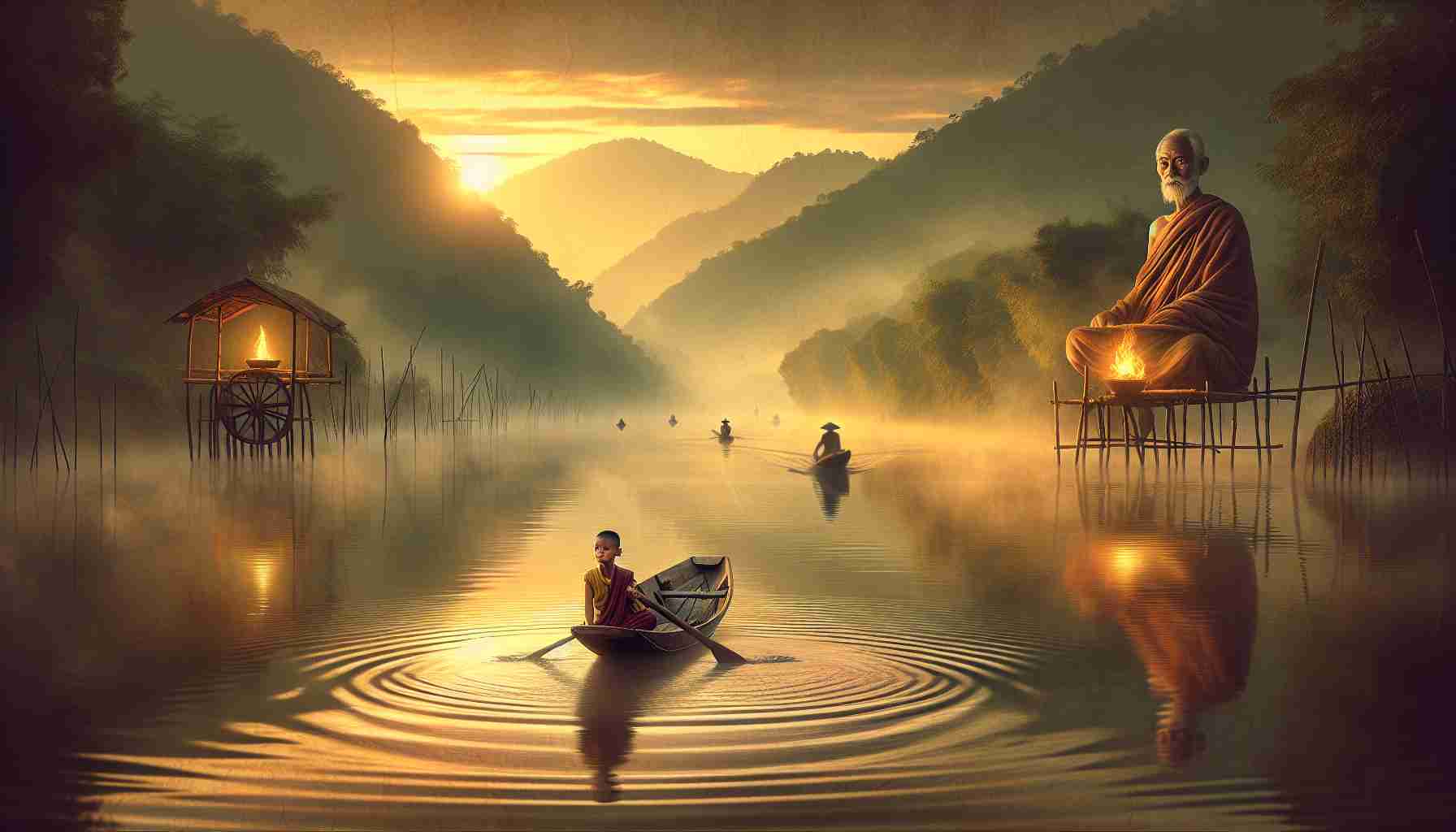

The river was still that morning, almost like glass. My father had asked me to take the fishing boat across to check the nets. I was twelve, and I wanted to prove I was ready. The sun rose slowly behind the mountains as I tied the rope and pushed away from the dock. My name is Jun, and this is the story of how an empty boat taught me a lesson I’ll remember forever.
The trip across the river was quiet. Water lapped gently at the sides as I rowed. Birds chirped in the distance, and the air smelled like fresh mist and pine trees. Everything felt calm—until I saw another boat drifting toward me.
“Hey!” I shouted. “Watch where you’re going!”
But the boat kept floating closer, bumping into mine with a soft thud.
I stood up, angry. “Who do you think you are?”
That’s when I realized—the boat was empty.
No one had been shouting back. No one had ignored me. The boat must’ve come loose from the shore. There was nothing to be mad at.
I sat down slowly, my anger slipping away like water through my fingers. I stared at that empty boat for a long time.
Later that day, after checking the nets and rowing home, I found my grandfather sitting by the fire. He was old, with long gray hair and eyes that saw deeper than most people spoke.
“Grandfather,” I said, “I got angry today. At a boat with no one in it.”
He smiled softly and nodded.
“That boat,” he said, “was not empty. It was full of a lesson.”
I tilted my head.
“When a boat with a person bumps into you, you get mad. You blame them. But when it’s empty, there’s no one to blame. And so—you let it go.”
I sat beside him, still trying to understand.
“In life,” he continued, “people bump into us. Sometimes with words. Sometimes with actions. If we see them as just boats on the river, moved by winds we can’t see, rain we didn’t cause, then we forgive. We stop thinking it was all done to hurt us.”
I didn’t say anything for a while.
That night, while lying in bed, I thought about all the times I’d gotten upset at others—at my little sister when she broke my toy, at Chen for pushing me during the game, even at Father for making me do chores.
What if, I wondered, their boats were just moving in the river, bumped by things I didn’t see?
The next morning, I returned to the river. The same water. The same boat. But now my heart felt lighter.
I didn’t change overnight. But now, whenever I felt the storm rising inside me, I remembered that drifting boat. And slowly, I learned to float, to breathe, to trust the Way of the River—that I didn’t need to fight every wave, only to flow with it.
And that, perhaps, is when I began to understand the Tao.
The river was still that morning, almost like glass. My father had asked me to take the fishing boat across to check the nets. I was twelve, and I wanted to prove I was ready. The sun rose slowly behind the mountains as I tied the rope and pushed away from the dock. My name is Jun, and this is the story of how an empty boat taught me a lesson I’ll remember forever.
The trip across the river was quiet. Water lapped gently at the sides as I rowed. Birds chirped in the distance, and the air smelled like fresh mist and pine trees. Everything felt calm—until I saw another boat drifting toward me.
“Hey!” I shouted. “Watch where you’re going!”
But the boat kept floating closer, bumping into mine with a soft thud.
I stood up, angry. “Who do you think you are?”
That’s when I realized—the boat was empty.
No one had been shouting back. No one had ignored me. The boat must’ve come loose from the shore. There was nothing to be mad at.
I sat down slowly, my anger slipping away like water through my fingers. I stared at that empty boat for a long time.
Later that day, after checking the nets and rowing home, I found my grandfather sitting by the fire. He was old, with long gray hair and eyes that saw deeper than most people spoke.
“Grandfather,” I said, “I got angry today. At a boat with no one in it.”
He smiled softly and nodded.
“That boat,” he said, “was not empty. It was full of a lesson.”
I tilted my head.
“When a boat with a person bumps into you, you get mad. You blame them. But when it’s empty, there’s no one to blame. And so—you let it go.”
I sat beside him, still trying to understand.
“In life,” he continued, “people bump into us. Sometimes with words. Sometimes with actions. If we see them as just boats on the river, moved by winds we can’t see, rain we didn’t cause, then we forgive. We stop thinking it was all done to hurt us.”
I didn’t say anything for a while.
That night, while lying in bed, I thought about all the times I’d gotten upset at others—at my little sister when she broke my toy, at Chen for pushing me during the game, even at Father for making me do chores.
What if, I wondered, their boats were just moving in the river, bumped by things I didn’t see?
The next morning, I returned to the river. The same water. The same boat. But now my heart felt lighter.
I didn’t change overnight. But now, whenever I felt the storm rising inside me, I remembered that drifting boat. And slowly, I learned to float, to breathe, to trust the Way of the River—that I didn’t need to fight every wave, only to flow with it.
And that, perhaps, is when I began to understand the Tao.